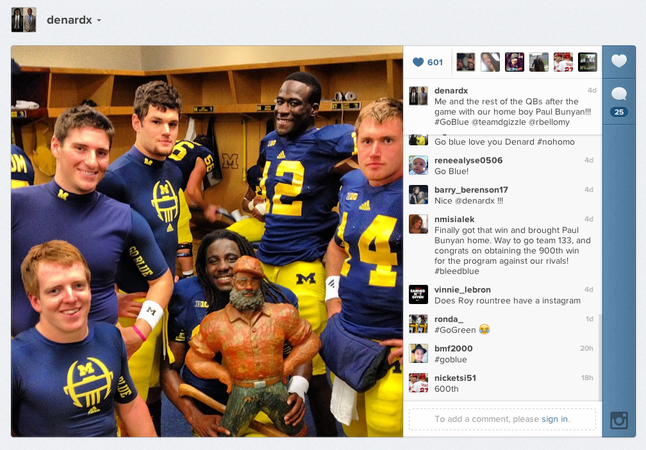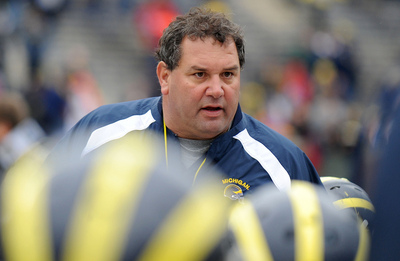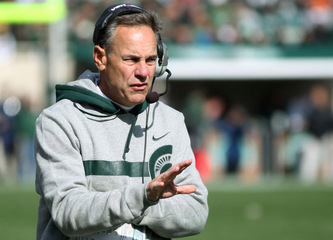University of Michigan athletes sign social media policy in bid to avoid controversy as Twitter incidents multiply

University of Michigan quarterback Denard Robinson posted this photo on Instagram after the Wolverines' win against the Spartans on Oct. 20.
For college athletes, social media use tends toward the extreme: It's either a blessing or a curse.
In the past year, two University of Michigan football players earned their team secondary NCAA violations by inadvertently tweeting at a recruit; a third-string Ohio State quarterback became infamous when he tweeted that classes are "pointless;" and a top-rated recruit lost his chance to play with the Wolverines after he authored sexually and racially charged tweets.
These few Twitter snafus eclipse the tens of thousands of 140-character notes sent each day that reflect well on college athletes. "When blaming others you give up the power to change," Michigan quarterback Denard Robinson tweeted to his 50,000-plus followers in September.
But such positive tweets are rarely the ones that stick with people — it's the mistakes that fans never forget. That's part of the reason U-M's athletic department formalized its social media practices this fall.
The department now distributes the same set of guidelines to all teams and asks each athlete to sign a social media use agreement. Previously, social media practices were less streamlined and formalized.
"It was more reactionary," said associate U-M athletic director David Ablauf, who handles athletic department communications.
The policy is straightforward, advising students not to post when they're emotional, not to use offensive language or slurs and not to tweet during class. If athletes violate the policy they can be reprimanded or, worse, face suspension.
Ablauf says that since the rise of social media, U-M has suspended a "handful" of student athletes because of inappropriate posts. No suspensions, he said, occurred on the football, basketball or hockey teams.
Setting limits

Football coach Brady Hoke
Angela J. Cesere | AnnArbor.com
Michigan's decision to set a formal policy and have students sign an agreement follows a national trend of colleges tightening their grip on student athletes' social media practices.
Some colleges go much further than Michigan, forcing athletes to allow school officials access to their private accounts (such as Utah State University), banning players from using a long list of words on Twitter (such as University of Kentucky), or forbidding the students from using Twitter altogether. Many schools have hired third-party companies to monitor athletes' posts around the clock.
Ablauf and his communications team monitor student athletes' social media use with applications like Tweetdeck, but the school does not pay a third-party company. The department does, however, bring in communications specialists to teach players social media dos and don'ts.
Lee Gordon, a media trainer who has worked with teams throughout the country, including some at Michigan, says social media becomes increasingly important to athletes and fans each year.
"Some athletes can rattle off to you, 'I have 14,000 followers on Twitter.' They know that more than they know how many points they got last year," he says.
Troubling incidents
"Used responsibly, social media can be a great way to interact with friends, fans and the public and promote your sport and the University," Michigan's current guidelines say. "Used irresponsibly it can be a quick way to destroy your reputation in 140 characters or less!"
The statement is all too true.
In September, Robinson completed just 11 of 26 passes in a 41-14 loss to Alabama that sent the Wolverines reeling into their 2012 season. As Robinson stumbled, Michigan State players took to Twitter to mock their rival.
"Even a blind squirrel can get a nut ever [sic] once in a while," a MSU running back tweeted. "Denard is soooo bad!" a safety tweeted in all caps. "Is this guy really a QB?" a Spartans linebacker asked on Twitter.
The tweets were deemed classless by sports commentators and gained regional media attention, especially after Michigan State football coach Mark Dantonio chastised his players publicly, saying "our guys need to keep their mouths shut."
Meanwhile Michigan coach Brady Hoke called the tweets a "reminder of how we want to represent this program."
Widely criticized incidents on social media have been relatively rare for the Wolverines. In March, receiver Roy Roundtree and linebacker Kenny Demens each earned the football team secondary NCAA violations for tweeting at Michigan recruit Mike McCray, who attends Roundtree's former high school.
Thinking he was sending a harmless tweet, Roundtree wrote "S/O to my lil brotha Mike McCray @MJM92013 for committing to Michigan today."
However innocent Roundtree's intentions, the tweet violated an NCAA bylaw that prohibits players from publicly contacting unsigned recruits.

Michigan State football coach Mark Dantonio
'Pulling the veil off their lives'
Many Twitter mishaps are more brazen.
For example, Michigan was strongly recruiting four-star New Jersey prep school cornerback Yuri Wright but backed off when offensive tweets he fired off to his 1,600 followers made national headlines. The tweets referred crudely to women and were racially charged.
The tweets turned off recruiters and got the teen booted from his private school.
Backup Buckeyes' quarterback Cardale Jones sent this missive to his followers, enraging fans throughout Ohio and reinforcing the stereotypical jock image held by many: "Why should we have to go to class if we came here to play FOOTBALL, we ain't come to play SCHOOL classes are POINTLESS."
In an instant, the tweet turned Jones into an exemplar of what's wrong with college athletics.
"They're just pulling the veil off their lives and letting the whole world see: this is who you are," Gordon said of such incidents.
Twitter, in sum, can be a dangerous tool. It can instantly cut down a student athlete's nascent career if used poorly, but used correctly it can mold their burgeoning brand.
"You're dealing with 17-, 18-, 19-year-old kids," says Gordon. "Everybody wants to see inside their life —fans and opposing fans. As a student athlete, they have the power to break news and influence people."
Earlier this year Hoke said he will not ban his players from Twitter and other social media. Doing so, he said, doesn't engender responsibility.
Instead, he emphasized the role of education.
"There's a maturity that goes along with it," he said. "You've got kids ... growing up who aren't getting coached on the use of Twitter. We try to educate our guys all the time."
Added Ablauf:
"We teach them about the value of a brand; of their brand, their team brand and their athletic department brand," he said. "We tell them (not to) put anything on social media that you wouldn't want your family reading on the front page of a newspaper."
Documents
Read the current agreement: University of Michigan social media agreement for athletes.pdf
Read the guidelines: University of Michigan social media guidelines for athletes.pdf
Kellie Woodhouse covers higher education for AnnArbor.com. Reach her at kelliewoodhouse@annarbor.com or 734-623-4602 and follow her on twitter.


Comments
Kevin Shabinski
Wed, Oct 31, 2012 : 6:46 p.m.
Sounds good. Probably should write one up that they pledge to not drive drunk and not steal laptops too.
Goober
Tue, Oct 30, 2012 : 1 p.m.
Hoke should spend all of his waking hours finding a viable solution to his '1 person offense' instead of trying to find a way to quiet the energy of kids on social media.
WWBoDo
Tue, Oct 30, 2012 : 8:11 a.m.
Bet Kwame Kilpatrick wished he would have had such counseling.
Blue Marker
Tue, Oct 30, 2012 : 11:16 a.m.
"where is the class on texting?"
debling
Tue, Oct 30, 2012 : 3:09 a.m.
These athletes need support and protection more than anything. It is simply not the business of the University to comment, constrain or be concerned about the activities and / or statements made by athletes on their own free time. They are not slaves.
WWBoDo
Tue, Oct 30, 2012 : 8:16 a.m.
They are not slaves--they can turn in their scholarships or privilege to play at a premier University whenever they want. UM is handling this exactly right--by not banning participation in this media, but, rather, educating them on how best to use it to further enhance their own value, their team and the University. Slaves? You gotta be kidding.
CRichmond
Mon, Oct 29, 2012 : 7:25 p.m.
Would we say the same thing about a novel? Would we insist an author-athlete burn his books? What is the qualitative difference between quashing electronic media, and printed media?
a2citizen
Mon, Oct 29, 2012 : 10:02 p.m.
Bob, I meant to say as long as the novel met the standards of the left-wing media and commenters that voted themselves "up" all would be fine.
Billy Bob Schwartz
Mon, Oct 29, 2012 : 8:40 p.m.
a2///Kind of off the wall, I think. Where is your evidence for this? What are your sources, other than the RNC handouts?
a2citizen
Mon, Oct 29, 2012 : 8:33 p.m.
"Would we say the same thing about a novel?" Depends. If the novel met the standards of the left-wing media all would be fine. If the thoughts expressed were right-wing attitudes the athelete would be suspended.
aareader
Mon, Oct 29, 2012 : 7:22 p.m.
Free Speech?? Only if it fits the mold of some U of M administrator?? How will "kids" learn from mistakes they might make. Gives a new meaning to big brother.
Scott
Mon, Oct 29, 2012 : 4:48 p.m.
Ex congressman Weiner should be an example to all.
Billy Bob Schwartz
Mon, Oct 29, 2012 : 3:55 p.m.
The vultures are out there (here?) just waiting for a kid to slip up o they can put on their self-righteous and blast at them, and the U., and kids in general, and education, and book larnin', and all that infernal stuff. Most young people (and at least a few oldeer people) have a strong sense of honor and responsibility. A voluntary signing, along with education as to the bad things that loose lips can do to others, their famillies, and themselves, not to mention specifically the team, can, I believe, be a very strong force for good. I'm pretty sure the majority of the folks who write here are not college age kids, and yet, where's the prefrontal here? Experience and the perspective derived from it comes with the passage of time. They haven't had the time, so maybe this will help. I'm all for it.
Tru2Blu76
Mon, Oct 29, 2012 : 3:53 p.m.
"You've got kids ... growing up who aren't getting coached on the use of Twitter. We try to educate our guys all the time."– Coach Hoke. We "try"... and a few never learn. Never stop trying though. :-) It is said, "Silence is golden." With Twitter - not so much.
heartbreakM
Mon, Oct 29, 2012 : 3:46 p.m.
So let me get this straight: UM is implementing a policy about social networking which can result in suspension, but they have refused to have an athletic department-wide policy about illegal behavior like drinking and driving, stealing, etc. (Thus leaving it up to the coaches whose job security relies on winning) Sensible. Indeed.
heartbreakM
Mon, Oct 29, 2012 : 6:06 p.m.
And???
aggatt
Mon, Oct 29, 2012 : 5:36 p.m.
each teams meets with compliance and coaches every year to go over expectations and things that are not allowed (such as illegal behavior, ncaa violations, etc.)
justcurious
Mon, Oct 29, 2012 : 2:37 p.m.
Why is this the Top Story instead of the freeway shooter?
johnnya2
Mon, Oct 29, 2012 : 8:28 p.m.
Oh you mean the freeway shooter that wasn't? I guess somebody getting a rock through their window while driving should be top story? Typical of people who demand things be reported NOW, but if they get it wrong chastise them for not having all the facts.
Scott
Mon, Oct 29, 2012 : 4:49 p.m.
SSShhh. If no one mentions it it isn't really happening.
Ron Granger
Mon, Oct 29, 2012 : 2:06 p.m.
What if they don't sign? Is it a case of "sign this or else"?
Barb
Mon, Oct 29, 2012 : 12:54 p.m.
Let's remember these are still kids. The Prefrontal cortex doesn't fully develop until 25. I mean, really. The school is smart to keep a lid on it.
Z-man
Mon, Oct 29, 2012 : 3:46 p.m.
If the school needs to "keep a lid" on these kids because their brains won't be fully developed until they're 25, why do we let them vote when they're only 18? You can see the problem by simply looking at who they tend to vote for!
Itchy
Mon, Oct 29, 2012 : 1:55 p.m.
Yes - censor the students! Keep a muzzle and lid on them!
johnnya2
Mon, Oct 29, 2012 : 12:37 p.m.
I prefer the University and the rest of us let people speak. I like to know what they really think. Giving them some direction (as they do in regards to the media) is fine, but unless the U is going to implement the SAME EXACT policy throughout the U, then they are violating the NCAA rules which purport to say athletes should not get special privledges due to their sport. The Roundtree incident is one of the most ridiculous things I have ever heard of in my life. By definition I am a booster of the UM. If I tweet a kid I know and say congratulations am I now breaking NCAA bylaws? A completely asinine rule. I guess if Brady Hoke had a son who committed to UM, he could not say, "I love you son and hope you enjoy your years at UM"?
Silly Sally
Mon, Oct 29, 2012 : 12:09 p.m.
If true, someone such as Mills, simply put, should not be admitted to UM if they lack the GPA or test scores. There are far too many who play for a few semesters or even 4 years, never graduate, and never make the pros. While Mills made the pros, UM doesn't "need" a 1.0 GPA person. The military academies have the correct attitude about this topic, but then ARMY lost to EMU last week. Go NAVY, Beat ARMY!
aggatt
Mon, Oct 29, 2012 : 5:32 p.m.
you would be academically ineligible to play with a 1.0.
MRunner73
Mon, Oct 29, 2012 : 12:08 p.m.
For older folks, like myself, it is hard to understand. Comments sections like AA.com is as far as I go. It is a good idea to have a social media policy for U of M athletes.
Tesla
Mon, Oct 29, 2012 : 11:49 a.m.
Let them tweet. Whats wrong with knowing the truth about these people?
Jim Osborn
Mon, Oct 29, 2012 : 11:24 a.m.
It is amazing that this has to be an official policy, since one would think that someone smart enough to get into UM would have enough common sense to realize not to do certain things. That prep school case is especially strange, as I would imagine that this kid came from a background where he would be aware of the ramifications of his use of Twitter.
a2citizen
Mon, Oct 29, 2012 : 12:29 p.m.
Sally, we'd have to eliminate voting altogether. Common sense isn't a function of age.
Silly Sally
Mon, Oct 29, 2012 : 12:02 p.m.
@doglover - If most students lack common sense, then should we, as a nation, repeal the 26th amendment to the US Constitution, restoring the voting age to 21?
doglover
Mon, Oct 29, 2012 : 11:33 a.m.
Being smart doesn't mean one has common sense and good judgment, as we see all too often with college kids. Today's youth grew up with social media, so it's integral to their lives and thoughts of a downside probably don't occur until something goes wrong for them personally.
Goober
Mon, Oct 29, 2012 : 11:30 a.m.
Where have you been? Most kids today lack common sense and use social media to extreme limits.